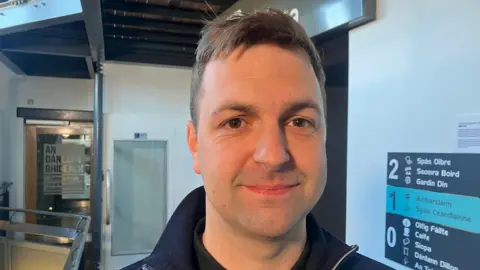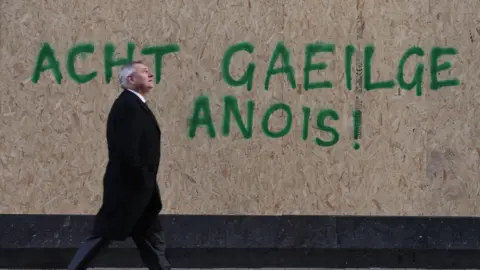First Irish language 'strike' over cross-border cuts
 BBC
BBCAn Irish language "strike" is taking place for the first time in protest at cuts to cross-border language funding.
More than 40 language organisations in Northern Ireland and the Republic of Ireland will take part in the action on Wednesday.
Organisations in areas like Belfast, Londonderry, Dublin, Galway and Donegal will be among those to close their doors on Wednesday morning.
The half-day strike has been prompted by cuts by the all-Ireland Irish language agency Foras na Gaeilge.
Founded in 1999 as a result of the 1998 Good Friday Agreement, Foras na Gaeilge is a cross-border body responsible for the promotion of the Irish language throughout the island of Ireland.
Around a quarter of its funding is from the Stormont Executive and around three-quarters is from the government in the Republic of Ireland.
Foras na Gaeilge has said it has to make savings of more than €800,000 (£669,000) in 2025 and that will mean funding cuts to some groups operating in Northern Ireland.
The cuts subsequently led to a dispute between the Democratic Unionist Party (DUP) and Sinn Féin over funding for North-South bodies.
Deputy First Minister Emma Little-Pengelly, of the DUP, denied blocking the then-Finance Minister Caoimhe Archibald's plans to change the funding arrangements.
But Sinn Féin accused the DUP of "holding up" new funding proposals for cross-border bodies.
Strike 'last resort'
 PA Media
PA MediaThe strike on Wednesday morning will mean that venues and organisations like the Cultúrlann McAdaim Ó Fiaich and Glór na Móna in Belfast and Cultúrlann Uí Chanáin in Derry will close from 09:30 GMT to 13:00.
The Advocacy Manager of Conradh na Gaeilge, Conchúr Ó Muadaigh, said that it was the first time that the Irish language and Gaeltacht community had taken strike action.
"This is an action of last resort," he told BBC News NI.
"We feel like we're not being listened to."
Mr Ó Muadaigh said they are "encouraging and shaming" both the Northern Ireland and Republic of Ireland government's to ensure there is action to address the funding issue "as a matter of urgency".
"These groups met over two weeks ago in Dublin at an emergency meeting," he added.
"As a result of that they have called a half-day action to encourage both governments to reverse these cuts and to make sure that we have a long-term solution to the sustainable crisis that we have."
Mr Ó Muadaigh claimed that agreement on a new funding mechanism for North-South bodies was being "blocked" by the DUP.
"Groups are now calling on both governments to find a practical solution to reverse those cuts but indeed look at a long-term solution to the funding crisis that exists within the North-South bodies, in particular Foras na Gaeilge," he said.
In a statement, President of Conradh na Gaeilge, Ciarán Mac Giolla Bhéin, said the strike was "a matter of regret."
"It is clear that we have a huge problem and that the new cross-border agency, which is responsible for the proper funding of the promotion of the Irish language, has been completely failed by both governments in the last 20 years," he said.
He described the latest cuts as "disastrous" and will affect groups who are already under severe funding pressure.
"Today's strike is a testament to the frustration and anger, not just at the latest curtailment, but the long-term disinvestment in Irish language funding," he added.
The organisations on strike are collectively calling for a new funding model for Foras na Gaeilge and for the organisation to reverse the cuts if it receives additional funding from the governments.
